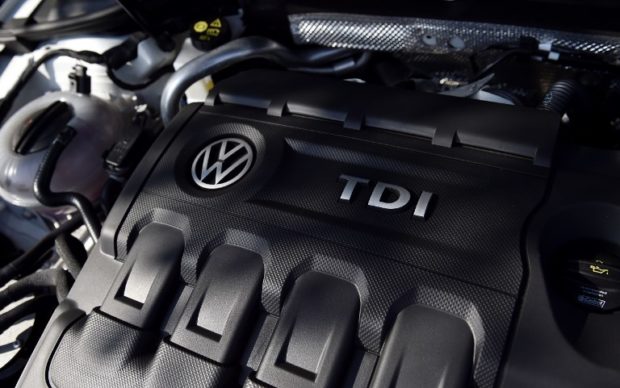Is ‘diesel summit’ the last chance for Germany’s favorite engine?

The logo of German car maker Volkswagen (VW) is seen on a VW Golf car in Milton Keynes, north of London, on October 2, 2015. AFP
FRANKFURT AM MAIN, Germany — Germany hosts a debate on the future of diesel engines next week as pressure grows on the government and automakers to curb or ditch a technology tarred by a reputation for pollution and cheating.
The “national diesel forum” takes place in Berlin on Wednesday amid renewed suspicions of emissions-fixing and a clamor for diesel-powered vehicles to be banned from cities to reduce pollution.
Famous for its engineering prowess, its profitability and its role as an employment powerhouse, the car sector traditionally wields massive political clout in Germany.
But both parties in the governing coalition, the center-left Social Democratic Party (SPD) led by Martin Schulz and Chancellor Angela Merkel’s center-right Christian Democratic Union (CDU/CSU), are keeping the industry at arm’s length as September parliamentary elections loom.
“Mrs Merkel is trying to calm things down before the elections, that’s the main reason for this summit,” Ferdinand Dudenhoeffer of the CAR automobile research center told ARD public television.
Breaking with a political habit of hewing close to carmakers — who provide more than 800,000 jobs in Germany’s largest industrial sector — Environment Minister Barbara Hendricks said Thursday that overfamiliarity had been a mistake, as it allowed company bosses to believe they were untouchable.
Anything but a ban
Hendricks and Transport Minister Alexander Dobrindt will lead a summit packed with carmakers active in Germany, including VW with its Audi and Porsche subsidiaries, Mercedes-Benz maker Daimler, BMW, Opel and Ford, whose European HQ stands in Cologne.
On Thursday, Dobrindt ordered Porsche to recall 22,000 vehicles across Europe after what he called “illegal” software disguising the true level of emissions had been discovered in its Cayenne and Macan models.
Because the affected models are still being manufactured, the government will also deny any permits for the vehicles “until new software is available,” he said.
The VDA auto industry federation, the car importers’ association VDIK, powerful trade union IG Metall and the local and regional governments most affected by air pollution are all invited to Wednesday’s talks.
Topping the list will be the task of reducing air pollution from diesel technology.
But Dudenhoeffer expects nothing but a “pretend solution” that will not go far enough, and consumer and environmental organizations are incensed that they have been left off the invitation list.
Even so, widening public concern about pollution provides a powerful spur for the auto industry to take a long, cold look at diesel.
Germany has already been warned by the European Commission about its bad air quality. On Friday, a court in Stuttgart, the home of Mercedes-Benz and Porsche, found that a ban on older diesel vehicles would be the most effective way of reducing the pollution and protecting public health.
Such restrictions could be a massive blow to those using the cars, which make up around one-third of the total on German roads.
The Stuttgart ruling also piles pressure on politicians to abandon their support for a voluntary approach by the car industry.
Daimler has said it will recall some three million vehicles for a software upgrade to reduce nitrogen oxide (NOx) emissions and VW has announced almost one million more refits, bringing its total to around four million. Audi and BMW have each promised smaller numbers of fixes to their cars.
But Hendricks says software updates alone will not fix the problem.
Industry leaders understand that they are “at a crossroads,” she said.
Other countries have announced drastic measures — even if implementation remains decades away.
Both Britain and France will stop sales of fossil-fuel vehicles from 2040, but the move appears extremely unlikely in Germany, which has deep historic connections to diesel. The technology can be traced to a German inventor, Rudolf Diesel, in the 1890s.
Part of the problem is that some foreign manufacturers invested heavily on hybrid or all-electric vehicles to reduce carbon dioxide (CO2) emissions, but Germany’s car industry tended to bet on diesel.
The fuel contributes less climate-altering carbon dioxide (CO2) gas than petrol-burning motors. But it emits more NOx, which contributes to the formation of harmful smog, as well as fine particules that can hurt respiratory and cardiac health. CBB/rga














